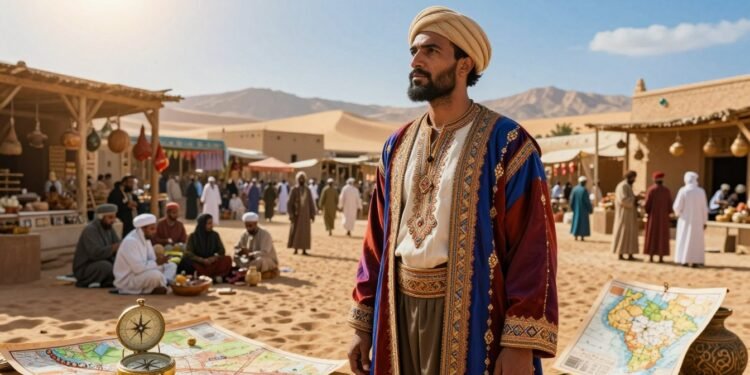Et si un seul homme pouvait raconter le monde médiéval dans son intégralité ?
Abu Abdallah Ibn Battuta est né en 1304 à Tanger. Issu d’une famille berbère de lettrés musulmans, il quitte sa ville à 21 ans pour un pèlerinage à La Mecque. Ce voyage simple deviendra une quête de connaissance de près de trente ans.
L’explorateur a parcouru plus de 120 000 kilomètres entre 1325 et 1349. Ses pas l’ont mené de l’Afrique du Nord à la Chine, et de la Volga à Tombouctou. Il a traversé trois continents et découvert des dizaines de cultures.
Cette aventure extraordinaire a été possible grâce à l’unité du monde islamique de l’époque. Le récit de ses pérégrinations, compilé sous le titre « Rihla », offre une source historique inestimable. Il décrit avec précision les sociétés, les coutumes et les villes du XIVe siècle.
La motivation initiale du pèlerinage s’est transformée en une soif insatiable de découverte. Sur ordre du sultan mérinide, le savant Ibn Juzayy al-Kalbi a aidé à mettre par écrit ces mémoires. Elles constituent aujourd’hui un témoignage unique.
Points Clés à Retenir
- Ibn Battuta est un explorateur marocain du XIVe siècle, né à Tanger en 1304.
- Son voyage a duré près de 29 ans et couvert une distance estimée à 120 000 km.
- Son récit, la « Rihla », est une source précieuse sur le monde islamique médiéval.
- Il a visité des terres s’étendant de l’Afrique de l’Ouest à l’Extrême-Orient.
- Ses observations ont une grande valeur ethnographique et historique.
- Son périple a débuté comme un pèlerinage avant de devenir une quête de savoir.
- Son œuvre a été compilée par Ibn Juzayy al-Kalbi sur commande du sultan.
Introduction à Ibn Battuta et à son univers
L’identité du célèbre voyageur était profondément ancrée dans la tradition savante de l’islam médiéval. Il était un érudit musulman, formé dans l’école malikite de jurisprudence.
Pour les étudiants de cette époque, le voyage était une étape clé de l’éducation. Cette quête de savoir, appelée rihla, les menait auprès de maîtres renommés à travers le monde.
Ce statut de lettré lui offrait un accès et un respect immédiats dans les territoires islamiques. Il se déplaçait principalement en se joignant aux grandes caravanes et en embarquant sur des navires marchands.
Son récit fut compilé des années plus tard, en 1356, avec l’aide du savant Ibn Juzayy. Ce travail devint urgent après qu’il eut perdu une partie de ses notes personnelles lors d’une attaque.
Malgré quelques interrogations sur la précision de certains épisodes, son œuvre constitue un témoignage historique de première main. Elle nous plonge dans l’univers intellectuel du Maghreb du XIVe siècle sous les Mérinides.
Contexte historique et religieux du XIVe siècle au Maroc
Pour comprendre le parcours d’Ibn Battuta, il faut plonger dans le Maroc de son époque. Cette époque fut marquée par la dynastie mérinide, stable et prospère.
Les dynasties et le rôle du sultan
Quatre sultans mérinides se sont succédé durant sa vie. Abu ‘Inan Faris, notamment, ordonna la rédaction de la Rihla.
Le sultan était le protecteur de la foi islamique. Il agissait aussi comme mécène des savants et des arts.
La richesse du royaume reposait sur un dinar d’or de haute qualité. Ce métal jaune provenait du commerce transsaharien avec l’Afrique subsaharienne.
La formation religieuse et les études coraniques
Fès représentait le centre intellectuel et religieux du royaume. La ville attirait les étudiants en sciences islamiques.
C’est là qu’Ibn Battuta étudia le fiqh de l’école malikite. Cette formation juridique était dominante au Maghreb.
Le système éducatif traditionnel incluait le Coran, le hadith et la langue arabe. Cette culture de l’apprentissage encourageait les voyages d’étude, comme le pèlerinage.
Les débuts du périple : De Tanger à La Mecque
Un jeune homme de 21 ans quitte Tanger avec un sac léger et une ambition spirituelle immense. Le 14 juin 1325, Ibn Battuta entame son pèlerinage à La Mecque. Ce voyage devait durer environ un an et demi.
Le pèlerinage et son importance spirituelle
Le hajj constitue le cinquième pilier de l’islam. C’est une obligation religieuse pour tout musulman ayant les moyens physiques et financiers. Pour un érudit comme lui, ce pèlerinage représentait l’apogée de sa foi.
Départ, préparatifs et premiers obstacles
Le départ nécessitait des préparatifs minutieux. Le jeune voyageur devait rassembler des provisions, de l’argent et des lettres de recommandation. Il rejoignit une caravane pour traverser le Maghreb central en sécurité.
Son premier arrêt important fut Tunis, où il arriva pendant les festivités de l’Aïd. À Tripoli, il se maria, mais un différend familial provoqua un divorce rapide. Ces événements montrent les défis personnels du périple.
La destination sacrée semblait encore lointaine. Il ignorait alors que ce pèlerinage se transformerait en une odyssée de 29 ans à travers le monde.
Exploration du Maghreb et des villes nord-africaines
Le trajet vers l’est mena le voyageur à travers un Maghreb central politiquement divisé mais culturellement uni. Cette région était partagée entre le royaume ziyyanide en Algérie et le sultanat hafside en Tunisie.
Malgré cette division, les penseurs de l’époque voyaient cette partie de l’Afrique nord comme un bastion d’un islam pur et unifié. Cette perception contrastait avec les divisions sectaires observées plus à l’est.
Itinéraires à travers le Maghreb central
Ibn Battuta traversa rapidement cette zone. Son parcours le fit passer par Bijaya et Tlemcen, puis par Tunis et Soussa.
Ces cités étaient des plaques tournantes commerciales vitales. Elles connectaient les routes de l’or subsaharien aux ports de la Méditerranée.
Les dynasties locales frappaient des dinars d’or et des dirhams d’argent. Cette monnaie solide soutenait un commerce florissant dans tout le pays.
Rencontres et échanges culturels
Partout, le pèlerin fut accueilli avec respect. En tant que lettré, il échangea avec des savants et des juges locaux.
Ces rencontres enrichirent sa compréhension de la culture régionale. Il nota les pratiques religieuses, l’architecture des mosquées et les coutumes urbaines.
L’hospitalité reçue dans chaque ville facilita grandement son voyage. Ce réseau d’accueil était typique du monde islamique médiéval du centre du Maghreb.
Les routes vers l’Orient : De l’Afrique du Nord au Moyen-Orient
Le réseau commercial florissant du XIVe siècle offrait les voies d’accès essentielles pour quitter l’Afrique du Nord. Ibn Battuta s’intégra systématiquement à ces flux, rejoignant les grandes caravanes ou embarquant sur des navires marchands.
Ces convois constituaient le seul moyen viable pour traverser les vastes étendues désertiques. Une caravane offrait sécurité, logistique et compagnie.
La route terrestre principale passait forcément par l’Égypte. Ce pays était la porte obligée vers la péninsule Arabique et ses lieux saints.
Le voyage en caravane suivait un rythme strict. Les départs étaient calés sur les saisons et les étapes dictées par les points d’eau. Une hiérarchie sociale s’établissait parmi les voyageurs.
Ce système reposait sur l’expertise des guides bédouins. Ces hommes connaissaient chaque dune et chaque source cachée dans une terre aride.
Les dangers étaient constants. Les brigands guettaient, et le climat extrême menaçait les imprudents. Pourtant, l’infrastructure commerciale existante rendait l’impensable possible.
Au fil des kilomètres, le statut du pèlerin marocain évolua. Il devint un voyageur professionnel reconnu, sachant naviguer dans ce monde mobile.
Voyage en Égypte : Du Nil à Alexandrie
En avril 1326, le voyageur marocain atteignit enfin les terres de l’Égypte, un royaume réputé pour ses richesses et ses monuments antiques.
Son premier arrêt fut la grande cité portuaire d’Alexandrie. Il y fit une description détaillée du célèbre phare, encore debout à cette époque. Lors de son retour en 1349, il ne trouva plus qu’un champ de ruines, détruit par les séismes.
La description du Caire et des pyramides
Il se rendit ensuite au Caire, place forte du pouvoir mamelouk. Le pèlerin nota l’ingénieux système fiscal local, basé sur la hauteur de la crue annuelle du Nil.
Près de la ville, il contempla les pyramides de Gizeh. Elles étaient alors recouvertes d’un parement de calcaire blanc, brillant au soleil. Il rapporta même l’histoire d’un souverain qui tenta d’y pénétrer en attaquant la pierre avec du vinaigre chaud.
Malgré la précision de ses observations, Ibn Battuta commit quelques erreurs. Il décrivit par exemple les pyramides avec une forme conique, une confusion possible avec d’autres monuments.
Traversée de la Syrie et de la Palestine
Quittant les rives du Nil, le pèlerin marocain s’engagea sur les routes poussiéreuses menant aux terres saintes de Palestine. Son voyage le conduisit d’abord à Gaza, puis vers Hébron et Jérusalem. Il fut frappé par l’absence totale de fortifications autour de la Ville Sainte, une mesure radicale prise par crainte d’un retour des Croisés.
Description de Damas et la grande mosquée des Omeyyades
Damas le subjugua. Ibn Battuta la décrivit comme un « paradis terrestre ». Au cœur de la cité se dressait la splendide grande mosquée des Omeyyades. Ses descriptions architecturales sont précises, notant les mosaïques et les colonnes.
À l’intérieur, il crut identifier le tombeau de Zacharie. Un siècle plus tôt, Ibn Jubayr y voyait le mausolée de la tête de Jean-Baptiste. Cette divergence montre comment les récits de voyage évoluent.
Les sites sacrés et les traditions locales
À Jérusalem, son émerveillement devant le Dôme du Rocher fut immense. Il longea ensuite la côte, visitant Tyr, Beyrouth, et des forteresses croisées comme le Krak des Chevaliers.
Il explora les villes syriennes d’Alep, Homs et Hama, notant leurs citadelles et roues hydrauliques. Une fois de retour à Damas en 1326, un événement majeur survint : il obtint sa licence officielle d’enseigner. Cette reconnaissance scella son statut d’érudit musulman accompli.
Expédition vers La Mecque et découvertes à Médine
La caravane quittant Damas pour l’Arabie progressait lentement, ponctuant son trajet d’étapes chargées de spiritualité et d’histoire. Une halte à Bosra précéda le passage près d’Al-Hijr.
Le voyageur y vit les anciennes demeures des Thamud, taillées dans le grès rouge. Son récit les interpréta comme un avertissement coranique laissé aux générations futures.
Les rituels du Hajj et les traditions islamiques
L’arrivée à Médine fut un moment d’intense émotion. Ibn Battuta se recueillit longuement sur la tombe du prophète Mahomet.
Il nota avec précision les différentes phases d’agrandissement de la mosquée. Ces travaux avaient souvent suscité des querelles entre dynasties rivales.
Après avoir visité les sites associés à la vie de Muhammad, il reprit la route vers La Mecque. Son premier pèlerinage allait devenir le point de départ d’une quête perpétuelle.
Il décrivit minutieusement chaque rite du hajj. Le tawaf autour de la Kaaba, le sa’i entre Safa et Marwa, et la station à Arafat étaient consignés avec détail.
De manière remarquable, il accomplit ce pèlerinage mecque à six reprises en vingt-neuf ans. Ce nombre témoigne de son attachement profond aux lieux saints.
Il assista aussi à la célébration du Mawlid. Le Qadi de La Mecque y distribuait de grands repas aux chérifiens et aux visiteurs, renforçant l’atmosphère de ferveur collective.
Le périple en Irak et en Perse
Le 17 novembre 1326, une nouvelle étape majeure du périple commença avec le départ vers l’Irak. Ibn Battuta se joignit à une caravane de pèlerins retournant chez eux. Il quittait les lieux saints pour des régions au passé tumultueux.
Les vestiges de Bagdad et l’héritage perse
La traversée du plateau désertique du Nejd dura quarante jours. Elle mena le voyageur à Nadjaf, site sacré abritant le tombeau d’Ali. Il rapporta les miracles qu’on y disait survenus, mais avec une prudence remarquable.
Ses descriptions le conduisent ensuite à Wasit, puis en bateau sur le Tigre jusqu’à Bassorah. Il fut surpris d’y entendre des fautes de langage lors de la prière.
En Perse, il visita Ispahan et Chiraz. Ces villes avaient été épargnées par les ravages mongols. Il y rendit hommage aux tombes des grands mystiques soufis, comme Saadi.
Le choc fut grand en atteignant Bagdad. La glorieuse capitale des Abbassides n’était plus qu’un champ de ruines. Ibn Battuta contempla les dégâts causés par l’armée de Houlagou Khan un siècle plus tôt.
Le contraste était frappant avec Tabriz, au nord. Cette ville avait négocié avec les Mongols. Elle était devenue un pays prospère et un centre commercial majeur. Ce voyage révèle une partie du monde en pleine reconstruction sous les Ilkhanides convertis à l’islam.
Itinéraires en Asie Centrale et en Anatolie
Après les terres saintes, l’infatigable explorateur se tourne vers le nord. Il traverse la Crimée et entre dans l’empire de la Horde d’Or, dirigé par le khan Özbeg.
Ibn Battuta note avec surprise que les femmes turques ne portent pas le voile. Elles jouissent d’une considération et d’une liberté inhabituelles pour l’époque.
Son voyage le mène ensuite vers Bolghar, près de la Volga. Il y observe les nuits extrêmement courtes de l’été boréal, un phénomène qui le fascine.
Le périple se poursuit à travers les steppes et les déserts de l’Asie centrale. Il passe par les anciennes cités de la Route de la Soie comme Gurgandj et remonte l’Amou-Daria.
À Boukhara et Samarcande, le spectacle est mélancolique. Ces joyaux du monde islamique ne sont plus que des ruines, dévastées par les invasions mongoles.
Il franchit le fleuve pour entrer dans la région du Khorassan. L’explorateur visite alors Hérat, Tus, Mashhad et Nishapur, d’anciens centres de savoir persans.
Cette partie du monde lui impose des défis pratiques majeurs. Les conditions climatiques sont extrêmes et l’approvisionnement en eau dans le désert reste une préoccupation constante.
Le séjour en Inde: De la fonction de juge aux intrigues du sultanat
Fin 1333, après un périple ardu, le voyageur marocain pose enfin le pied sur le sol du sous-continent indien. Il a traversé le désert du Cholistan et franchi le fleuve Sindh.
Cette partie de son récit est la plus longue. Elle couvre presque un tiers de l’ensemble de son ouvrage, la Rihla.
La carrière d’Ibn Battuta au service du sultan de Delhi
Le lettré fut présenté à Muhammad ibn Tughluq, le sultan de Delhi. Ce souverain était à la fois généreux et cruel, ce qui rendait sa cour dangereuse.
Il obtint un poste prestigieux de qadi, ou juge. Cette nomination lui assura un revenu confortable et un statut élevé.
Il demeura huit ans au service du sultanat. C’est la période la plus longue qu’il ait passée dans un seul pays durant toute son aventure.
La cour du sultan de Delhi était un nid d’intrigues. Le juge devait naviguer avec prudence entre les faveurs royales et les risques soudains de disgrâce.
En 1341, une mission diplomatique lui fut confiée. Il devait porter de riches présents à l’empereur de Chine.
Le navire fit naufrage au sud-ouest de l’Inde. Ayant tout perdu, le voyageur craignit à juste titre la colère du sultan. Il décida de fuir vers les Maldives, mettant fin à son époque indienne.
Aventures maritimes aux Maldives, à Ceylan et au Bengale
Après le naufrage de sa mission en Inde, le voyageur chercha refuge dans un archipel lointain. Il se rendit aux Maldives, craignant la vengeance du sultan de Delhi.
Sur place, ses compétences lui valurent une nomination comme qadi, ou juge. Il se maria aussi avec plusieurs filles de vizirs, une pratique habituelle pour lui.
La société maldivienne le surprit profondément. Le souverain était une femme et le droit maternel y était la règle. Les femmes, bien que pieuses, ne couvraient pas le haut de leur corps.
En tant que juge maghrébin, Ibn Battuta tenta d’imposer le voile intégral. Ses efforts échouèrent face aux traditions locales bien ancrées.
Ses alliances matrimoniales inquiétèrent le vizir Abd Allah. Ce dernier crut voir une manœuvre pour prendre le pouvoir et « invita » le juge à partir.
Le voyageur quitta donc les îles, laissant derrière lui épouses et un fils. Son récit le mène ensuite à Ceylan, l’actuel Sri Lanka. Il y entreprit un pèlerinage au pic d’Adam, un site sacré.
Les échanges culturels et économiques le long des routes
Sans le réseau dense des commerce, le long périple à travers trois continents aurait été une entreprise bien plus périlleuse. Ibn Battuta bénéficia constamment de cette infrastructure musulmane sophistiquée.
Elle structurait son voyage et connectait les cultures.
Les caravanes et les navires dans le monde islamique
Les systèmes de caravanes terrestres traversaient les déserts avec une organisation complexe. Elles suivaient des étapes régulières dictées par les points d’eau et une hiérarchie sociale stricte.
Sur mer, l’explorateur embarquait sur des boutres dans l’océan Indien. Ces navires reliaient l’Afrique à l’Asie, formant les artères du monde connu.
L’influence des échanges sur l’économie locale
Le long de chaque route, des produits spécifiques étaient échangés. Le Nord envoyait des dattes, du sel, de la céramique et du verre.
En retour, le Sud fournissait de la poudre d’or, de l’ivoire et des plumes d’autruche. Ces flux dynamisaient l’économie et façonnaient le développement urbain.
Ibn Battuta observa un nombre étonnant de systèmes monétaires. Des dinars d’or au Maghreb aux tankas en Inde, et aux cauris aux Maldives.
En Chine, sa découverte la plus fascinante fut le papier-monnaie. Ces billets remplaçaient les pièces de métal, une innovation qui tenait une place centrale dans les transactions.
Ibn Battuta : Le voyageur et son récit authentique
La comparaison entre les deux grands explorateurs médiévaux révèle des approches fondamentalement distinctes. Le célèbre Marco Polo voyageait en terres entièrement étrangères, où tout lui était inconnu.
Le pèlerin marocain, lui, évoluait presque toujours au sein du monde islamique familier. Sa formation religieuse lui assurait respect et reconnaissance partout où il passait.
Comparaison avec d’autres explorateurs comme Marco Polo
Cette différence fondamentale colore leurs récits. Les voyages du Vénitien décrivent l’étrangeté et l’émerveillement.
Le récit du Maghrébin, la Rihla, cherche plutôt à démontrer l’unité de la communauté musulmane. Il fut rédigé en 1356 avec l’aide du savant Ibn Juzayy.
Ce travail s’appuya sur une mémoire prodigieuse et des notes partiellement perdues lors d’une attaque. Certains passages, notamment sur le Mali, soulèvent des doutes.
L’ensemble est cependant considéré comme authentique. Pour des régions comme la côte est de l’Afrique, ses écrits sont les seules sources du XIVe siècle.
Ses observations ethnographiques et géographiques n’étaient pas scientifiques. Elles n’en restent pas moins des sources historiques irremplaçables.
L’objectif profond de son œuvre était de montrer la cohésion de l’islam à travers le globe. Ibn Battuta et Marco Polo ont ainsi offert deux visions complémentaires du monde médiéval.
Héritage et impact historique du grand périple d’Ibn Battuta
Comment un seul récit de voyage a-t-il pu devenir une source aussi précieuse pour les historiens du monde entier ? L’explorateur a parcouru près de 120 000 kilomètres en vingt-neuf ans. Cette distance équivaut à trois fois le tour de la Terre.
Après avoir terminé son dernier voyage au Mali en 1353, il rentra définitivement au Maroc. Le sultan mérinide Abu ‘Inan lui commanda alors de dicter ses mémoires. Le savant Ibn Juzayy al-Kalbi l’aida à rédiger la célèbre Rihla.
Ses dernières années se passèrent tranquillement à Fès. Ce calme contraste fortement avec ses trois décennies d’aventures incessantes à travers le monde.
La Rihla constitue un témoignage unique sur le monde islamique du XIVe siècle. Ses descriptions détaillées des sociétés, des économies et des paysages sont inestimables.
Ce récit a profondément enrichi notre connaissance de l’Afrique, de l’Asie et de la Méditerranée médiévales. Pourtant, son œuvre est restée longtemps méconnue en Occident.
Aujourd’hui, sa postérité est immense. Des monuments, des médailles et de nombreuses études académiques célèbrent ce grand voyageur. Son périple reste une référence majeure pour la découverte de cette époque.
Conclusion
En refermant la Rihla, on mesure l’ampleur d’une aventure humaine et intellectuelle unique. Ce périple de près de trente ans a couvert trois continents et la quasi-totalité du monde islamique du XIVe siècle.
Le récit de ces voyages offre un témoignage précieux sur la diversité culturelle et sociale de cette époque. Les observations sur les coutumes, notamment celles des femmes dans différentes sociétés, restent des sources ethnographiques majeures.
Parti pour un simple pèlerinage, Ibn Battuta a transformé son devoir religieux en une quête de découverte insatiable. Certains épisodes, comme celui de l’empire du Mali, font débat, mais l’ensemble de l’œuvre est authentique.
Son legs intellectuel est immense. La Rihla constitue une documentation irremplaçable pour les historiens. Aujourd’hui, cette figure symbolise la curiosité et l’ouverture transcendant les frontières.
FAQ
Qu’est-ce qui a motivé le départ de ce célèbre voyageur marocain ?
Sa motivation principale était d’accomplir le pèlerinage à La Mecque, un devoir religieux central en Islam. Jeune homme de 21 ans, il a quitté sa ville natale de Tanger avec le désir de voir le monde et d’étudier auprès de savants renommés le long de la route.
Combien de temps a duré son périple et quelles régions a-t-il explorées ?
Son voyage a duré près de trente ans, un exploit extraordinaire pour l’époque. Il a parcouru l’Afrique du Nord, l’Égypte, le Moyen-Orient, la Perse, l’Asie Centrale, l’Inde, les Maldives, Ceylan (Sri Lanka) et même atteint la Chine, parcourant bien plus de terre que son contemporain Marco Polo.
Quel rôle a-t-il occupé au sultanat de Delhi ?
À Delhi, le sultan Muhammad bin Tughluq l’a nommé juge (qadi). Il a servi dans cette fonction prestigieuse pendant plusieurs ans, s’immergeant dans la vie politique et culturelle complexe de la cour. Cette expérience est l’une des descriptions les plus détaillées de son récit.
Comment ses écrits nous informent-ils sur le XIVe siècle ?
Son récit, la *Riḥla*, offre une fenêtre unique sur la vie au XIVe siècle. Il documente les coutumes, l’économie, la politique et la culture des sociétés qu’il a traversées, servant de source historique inestimable sur le monde islamique médiéval et au-delà.
Quels ont été les principaux moyens de transport utilisés durant ses aventures ?
Il a principalement voyagé avec des caravanes à travers les déserts et le long des routes commerciales. Pour les traversées maritimes, comme vers les Maldives ou le Bengale, il embarquait sur des navires de commerce, bravant souvent des mers dangereuses.
Pourquoi son voyage aux Maldives est-il particulièrement notable ?
Aux Maldives, il fut de nouveau nommé juge par la population locale. Ses descriptions de l’archipel, de sa société et de son économie sont parmi les premières et les plus détaillées disponibles, marquant une destination importante dans son périple maritime.
En quoi son récit diffère-t-il de celui d’autres explorateurs ?
Contrairement à un marchand comme Marco Polo, ce voyageur était un érudit musulman. Son récit se concentre donc davantage sur la vie religieuse, les institutions juridiques et les rencontres avec des savants, offrant une perspective complémentaire sur l’époque médiévale.




